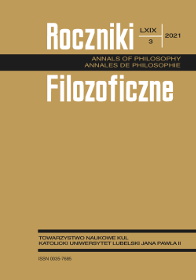The Argument from Divine Hiddenness and Christian Love
Abstract
In the paper it is argued that the conceptual resources of Christianity topple the hiddenness argument. According to the author, the variability of the divine love cast doubt on the soundness of Schellenberg’s reasoning. If we understood a perfect love as a maximal and equal concern and identification with all and for all, then a divine love would entail divine impartiality, but because of conflicts of interest between human beings the perfect, divine love cannot be maximal.
References
Aquinas, Thomas. Summa Theologica. Translated by English Dominican Fathers. New York: Benziger Brothers, 1947.
Frankfurt, H. G. The Reasons of Love. Princeton, NJ: Princeton University Press, 2004.
Hurtado, Larry. Why on Earth Did Anyone Become a Christian in the First Three Centuries? Milwaukee, WI: Marquette University Press, 2016.
Jordan, Jeff. “Divine Hiddenness and Perfect Love.” The European Journal for the Philosophy of Religion 9, no. 1 (2017): 187–202.
Jordan, Jeff. “The Topography of Divine Love.” Faith & Philosophy 29, no. 1 (2012): 53–69.
McCord Adams, Marilyn. Horrendous Evils and the Goodness of God. Ithaca, NY: Cornell University Press, 1999.
Mill, J. S. On Liberty. London: John Parker and Sons, 1859.
Pascal, Blaise. Pensées: Thoughts on Religion and Other Subjects. Translated by John Warrington, London: J. M. Dent & Sons, 1960.
Schellenberg, J. L. Divine Hiddenness and Human Reason. Ithaca, NY: Cornell University Press, 1993.
Schellenberg, J. L. 2015. The Hiddenness Argument: Philosophy’s New Challenge to Belief in God. Oxford: Oxford University Press.
Searle, John. Mind, Language, and Society: Philosophy in the Real World. New York: Basic Books, 1998.
Copyright (c) 2021 Roczniki Filozoficzne

This work is licensed under a Creative Commons Attribution-NonCommercial-NoDerivatives 4.0 International License.





